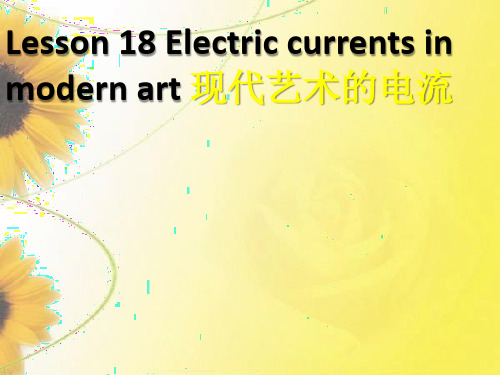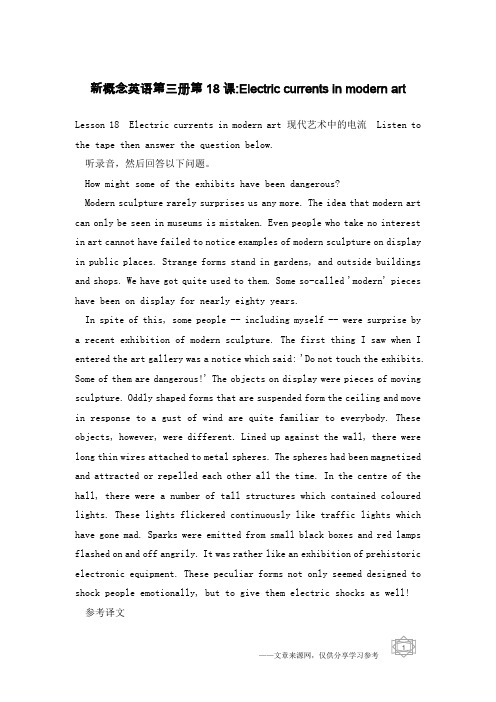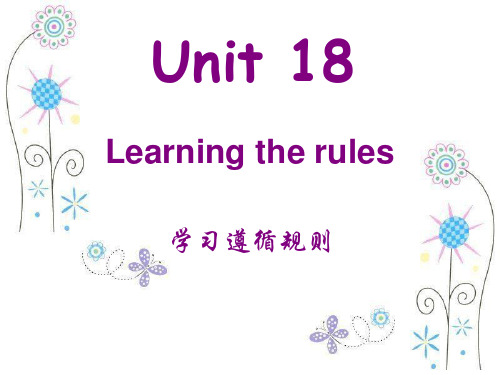新概念英语青少版3B Unit 18
青少版新概念英语3B-第18单元Unit18

K: Oh, is that ___! You _______ me . W: Do you mean ___you don’t mind ? K: Of course I don’t _____ ! Why would I _____ ? Karate’s a _____ , isn’t it ?
R: Dad! Have you asked mum yet ? W: What about ? R: Have you asked mum if I can start karate lessons ? W: No,I haven’t . I’ll … Shh! She’s coming .
R: Dad! Have you ____mum yet ? W: ____ ____? R: Have you asked mum __I can start ____ ____? W: No,I _____ . I’ll … Shh! She’s _____ .
---Has Claire found a job? ---I'll ask / find out if she's found a job.
---I must know whether Claire's found a job or not.
Conclusion(复习篇)
She says (that) she‘s lost her purse
.
K:What’s the mystery? Is Robert ___ ___? W: He’s fine . He just ____ me __ ___you something . K: Why doesn’t he ask me _____ ? W: He’s afraid ___ you’ll say no
新概念英语第三册Lesson18(共30张PPT)

Rarely = seldom
adv.尤其是具有否定意义的adv.置于句首,会 引起部分倒装
Rarely has he been so happy for years. Seldom have I watched a film so touching as Titanic. Hardly can I trust him !
2.n. 思潮,潮流;趋势,倾向
the great current of events 天下大势。
go with /against the current of the times 顺应/违反时势
current adj. 当前的,通用的,流行的
current affairs/news 当前时事 current fashion current account 活期存款 thw current animal year 本命年 the current price /rate 时价,成交价
emotionally adv.感情上
emotional adj.易激动的, 感情脆弱的 (unemotional) Women are often said to be more emotional than men. emotive [iˈməʊtɪv] adj.使感动的, , 动感情的 The word home is more emotive than house. emotion n.(抽象的)感情 Love, hated, and grief悲伤 are emotions. feeling n.某时的内心感受 I can't describe my feeling now.
fl- 移动的光 flicker 摇曳 to shine with unstready light The candle flickered in the wind. flash 闪光 to shine suddenly and brightly for a short time flash on and off 忽明忽暗 a flash of hope 一线希望 flash of lightning 闪电 flash of wit 灵机一动,突然出现的机智。 a flash in the pan 空枪;昙花一现(的人)。 in a flash 即刻,一刹那间 flare v./n.闪耀,闪光 flame n/v.火焰,发出火焰
新概念第三册第18课

fl- 移动的光 flicker v. 闪烁 shine unsteadily flash v. 闪光 shine for a moment flash on and off 忽明忽暗 flame v. 焚烧;泛红;n. 火焰 Her face flamed red with embarrassment. old flame 旧情人 gl- 不移动的光 glare vt. 瞪视;发眩光 The tropic sun glared down on us all day. glitter vi. (在阳光照耀下)闪光;闪烁 All that glitters is not gold is a well-known saying, meaning that not everything that looks precious or true turns out to be so. This can apply to people, places, or things that promise to be more than they really are. But gold will glitter forever.
• 1.Since they emit light directly, OLED displays do not need a backlight. • 由于也是自身发光,OLED显示器可以不用背光 灯。 • 2.Industries that emit carbon dioxide [daɪ'ɑksaɪd] would have to buy permits to do so. • 排放二氧化碳的产业必须要购买排放量之类的。 • 3.Earthquakes emit three types of waves which have their own characteristics. • 地震发出两种波,它们有各自的特征。
新概念青少版3Bunit18

Do you mind?
I don’t think(that) she will let me learn karate. I am afraid (that) She won’t let me learn karate. I am sure (that) she’ll say no.
Unit18 Learning the rules! Lena
Robert : Dad! Have you asked Mum yet? William : What about? Robert : Have you asked Mum if I can start karate lessons? William : No, I haven't. I'll... Shh! She's coming!
you something.
Karen: Why doesn’t he ask me himself?
William : He's afraid that you'll say no.
afraid adj. 害怕的;恐怕; 担心的
She did not seem at all afraid. 她一点儿也没显得害怕。
whisper ['wɪspɚ] n. 私语;谣 传vi. 耳语;vt. 低声说出
It fell upon my heart like
a sigh of her body and whisper of her heart. 它落在 我的心上,像她的身躯的叹息 和她心灵的低语。
新概念英语第三册第18课-Electric currents in modern art

新概念英语第三册第18课:Electric currents in modern artLesson 18 Electric currents in modern art 现代艺术中的电流 Listen to the tape then answer the question below.听录音,然后回答以下问题。
How might some of the exhibits have been dangerous?Modern sculpture rarely surprises us any more. The idea that modern art can only be seen in museums is mistaken. Even people who take no interest in art cannot have failed to notice examples of modern sculpture on display in public places. Strange forms stand in gardens, and outside buildings and shops. We have got quite used to them. Some so-called 'modern' pieces have been on display for nearly eighty years.In spite of this, some people -- including myself -- were surprise by a recent exhibition of modern sculpture. The first thing I saw when I entered the art gallery was a notice which said: 'Do not touch the exhibits. Some of them are dangerous!' The objects on display were pieces of moving sculpture. Oddly shaped forms that are suspended form the ceiling and move in response to a gust of wind are quite familiar to everybody. These objects, however, were different. Lined up against the wall, there were long thin wires attached to metal spheres. The spheres had been magnetized and attracted or repelled each other all the time. In the centre of the hall, there were a number of tall structures which contained coloured lights. These lights flickered continuously like traffic lights which have gone mad. Sparks were emitted from small black boxes and red lamps flashed on and off angrily. It was rather like an exhibition of prehistoric electronic equipment. These peculiar forms not only seemed designed to shock people emotionally, but to give them electric shocks as well! 参考译文现代雕塑不再使我们感到惊讶了。
新概念英语第三册第18课-Electric currents in modern art

新概念英语第三册第18课:Electric currents in modern artLesson 18 Electric currents in modern art 现代艺术中的电流 Listen to the tape then answer the question below.听录音,然后回答以下问题。
How might some of the exhibits have been dangerous?Modern sculpture rarely surprises us any more. The idea that modern art can only be seen in museums is mistaken. Even people who take no interest in art cannot have failed to notice examples of modern sculpture on display in public places. Strange forms stand in gardens, and outside buildings and shops. We have got quite used to them. Some so-called 'modern' pieces have been on display for nearly eighty years.In spite of this, some people -- including myself -- were surprise by a recent exhibition of modern sculpture. The first thing I saw when I entered the art gallery was a notice which said: 'Do not touch the exhibits. Some of them are dangerous!' The objects on display were pieces of moving sculpture. Oddly shaped forms that are suspended form the ceiling and move in response to a gust of wind are quite familiar to everybody. These objects, however, were different. Lined up against the wall, there were long thin wires attached to metal spheres. The spheres had been magnetized and attracted or repelled each other all the time. In the centre of the hall, there were a number of tall structures which contained coloured lights. These lights flickered continuously like traffic lights which have gone mad. Sparks were emitted from small black boxes and red lamps flashed on and off angrily. It was rather like an exhibition of prehistoric electronic equipment. These peculiar forms not only seemed designed to shock people emotionally, but to give them electric shocks as well! 参考译文现代雕塑不再使我们感到惊讶了。
青少版新概念2B unit18

---------------------------------------------------------------最新资料推荐------------------------------------------------------青少版新概念2B unit18Unit 18Read the label !看标签!1/ 25Did ken install a telephone?Did the baby cuckoo eat the other eggs? What appeared in his garden last spring? When did the young cuckoo hatch? Who watched excitedly? The show was over,wasn’t?---------------------------------------------------------------最新资料推荐------------------------------------------------------ ? label [ ‘leib?l] n. 标签 ? lunchbox [‘l?nt?b?ks] n. 午餐饭盒 ? stuff [st?f] n. 东西 ? chemistry [‘kemistri] n. 化学;化学药品 ? plane [plein] n. 飞机 ? miss [mis] v. 错过 ? discover [dis‘k?v?] v. 发现 ? anyway [‘eniwei] adv. 无论如何 ? honestly [‘?nistli] adv. 诚实地 ? at the same time 同时 ? Yuk! [j?k] 呸!3/ 25? practice n. 练习 ? enough adj. 足够的 ? Happened---happen 的过去式 v. 发生 ? gave ----give的过去式 v. 给 ? Went---go 的过去式 v. 去 ? felt---feel 的过去式 v. 感觉 ? sick adj. 恶心 ? A bit----a little 一点儿 ? needed---need的过去式 v. 需要 ? ate—eat的过去式 v. 吃 ? One after another 一个接一个---------------------------------------------------------------最新资料推荐------------------------------------------------------ labelmissaboutpracticeanyway stuffplaneYuk5/ 25标签 1发现 2飞机 1化学 3 同时 3错过 1诚实的 2东西 1---------------------------------------------------------------最新资料推荐------------------------------------------------------ Listening to the recording, and then answer this question:Q1:Why did Vikki miss breakfast that morning?Because she did her piano practice before school.Q2:When did Vikki feel really sick?She felt really sick after She ate four Crispy Trolls.7/ 25Lucy1.VikkiOne of these is a student. Some of these are students.Lucy: Do you want one of these, Vikki? (一般现在时)Vikki: No, thanks!I ate some of those about a year ago.Once was enough!固定短语,“一次就够了!”---------------------------------------------------------------最新资料推荐------------------------------------------------------ 2、时间状语Lucy: Why? What happened?放动词短语之后Vikki: I missed breakfast that morning,because I did my piano practice before school./t/Mum gave me my lunchbox,and I went for the bus.表目的双宾语动词短语9/ 253、一般地点状语放在句首表介绍场景,讲述的顺序Vikki: On the school busI felt a bit sick.原形:feel 频率副词常放句末表“概括” 事情就是这样I always feel sick on buses,anyway.(一般现在时表永恒的事实)---------------------------------------------------------------最新资料推荐------------------------------------------------------ 4、need (sb.) to do sth. e.g: I need you to help me.Vikki: I needed to eat something. I looked in my lunchbox and discovered the Crispy trolls.11/ 255、Vikki: I ate four Crispy trolls, one after another.原形:eat固定短语:一个接一个地吃过去式:/red/At the same time I read the label on the packet.固定短语:同时---------------------------------------------------------------最新资料推荐------------------------------------------------------ 6、“厌恶”(感叹词)强调“sick”Vikki: Then I felt really sick! Yuk!Believe meHonestly, Lucy, this stuff isn’t food.It’s chemistry. Read the label.13/ 25LUCY: Do you want one of these,Vikki? VIKKI: No, thanks ! I ate some of those about a year ago . Once was enough ! LUCY: Why?What happened? VIKKI:I ate breakfast that morning, because I did my piano practice before school. Mum gave me my lunchbox, and I went for the bus. VIKKI:On the school bus I felt a bit sick.I always feel sick on buses, anyway .---------------------------------------------------------------最新资料推荐------------------------------------------------------ VIKKI:I needed to eat something. I looked in my lunchbox and discovered the Crispy Trolls.VIKKI:I ate four Crispy Trolls. one after another. At the same time I read the label on the packet. VIKKI: Then I felt really sick!Yuk! Honestly Lucy, this stuff isn’t food. It’s chemistry. Read the label!15/ 25UNIT 18LESSON 36---------------------------------------------------------------最新资料推荐------------------------------------------------------ pronunciation /ps/chops perhaps chips tips keeps/ts/parts waits cats carrots bats17/ 25pronunciation /ks/box six fox fix/sp/crisp gossip---------------------------------------------------------------最新资料推荐------------------------------------------------------ pronunciation /st/waste best must rest/sk/ask desk19/ 25sellv. 卖,出售library n. 图书馆 page n.页chemical n. 化学物品 fortnight n.两个周 Pairs n.巴黎---------------------------------------------------------------最新资料推荐------------------------------------------------------ InfinitiveSimple pastbuy----bought come----came do----did drive----drove eat----ate feel----felt fly----flew have----had21/ 25Infinitive Simple pastgo----went put----put read/ri:d/--read/red/ ride----rode see----saw sell----sold sit----sat---------------------------------------------------------------最新资料推荐------------------------------------------------------ boughtcame felt readdid flew sawdroveatewentput satsoldrodehad23/ 25sat in the garden (yesterday) ate an apple①Whatdid Ken do yesterday? did Ken sit in the garden?He sat in the garden and ate an apple.②WhenHe sat in the garden yesterday.①DidKen sit in the garden yesterday and eat an apple? you sit in the garden yesterday?Yes, he did.②DidYes, I did. I sat in the garden and ate an apple.---------------------------------------------------------------最新资料推荐------------------------------------------------------ Homework:1、完成第一部分的听读复习并签字;2、背诵单词(5个);3、复习P22内容并完成书面作业;25/ 25。
青少版新概念3B-unit18

Learning the rules
学习遵循规则
whisper upstairs afraid
低语
在(往)楼上
担心的 是否
whether
fight wonder
打斗
想知道
低语
担心的 打斗 比较
根据汉语说出英 语单词.
想知道
是否
往楼上
空手道
afraid
Fight
whisper
mystery
Pronunciation
Please ask Mum pause if I can start karate lessons. I’ll find out pause whether she minds.
Pattern Practice
A: Has Claire found a job? B: I’ll ask her if she’s found one.
Pattern Practice
Listening
Homework
• • • • • • 1.听光盘5遍; 2.背课文; 3.抄写单词(4+1)听写; 4.抄写句子(2+1)听写; 5.完成课后练习; 6.家长签字。
Whether 与if 引导宾语从句,一般既可用whether也可用 if. 但是 (3)虽引导宾语从句,但为了强调宾语部分, 也可把从句放在句首,此时只用whether不用 if. Whether he will come I am not sure. 他是不是来我拿不准. (4)从句作介词宾语时只用whether不用if. It depends on whether it will be fine. 那得看是不是晴天.
- 1、下载文档前请自行甄别文档内容的完整性,平台不提供额外的编辑、内容补充、找答案等附加服务。
- 2、"仅部分预览"的文档,不可在线预览部分如存在完整性等问题,可反馈申请退款(可完整预览的文档不适用该条件!)。
- 3、如文档侵犯您的权益,请联系客服反馈,我们会尽快为您处理(人工客服工作时间:9:00-18:30)。
.
精品课件
11
New words and expressions
fight
Fighting!
.
精品课件
12
Grammar
Whether 与if
引导宾语从句,一般既可用whether也可用if.
但是
(1)or not放在whether之后时,只能用whether 不用if. E.g., I don’t know whether or not he will come.
我不知道他是不是回来.
(2)在强调任意选择时,用whether…or,此时不用 if替换whether. He asked me whether I wanted to go there by train or by bus.他问我是想乘火车还
.
精品课件
13
Grammar
Whether 与if 引导宾语从句,一般既可用whether也可用if.
3. Do you think martial arts are a good thing for young people? Why? / Why not?
4. Karen says, ‘All competitors are a kind of fighting. The martial arts are also about rules.’ What do you think?
once. 我不知道是不是该立刻去那里.
.
精品课件
16
Guided Conversation
1. Would you like to learn karate? Why? / Why not?
2. What new sport or activity would you like to learn? Why?
.
精品课件
Listening and understanding
KAREN: What are you two whispering about? ROBERT: Oh, er, nothing! I’m just going upstairs. See you later, Dad! WILLIAM: Yes, of course.
.
精品课件
New words and expressions
whisper
.
精品课件
8
New words and expressions
upstairs
.
精品课件
9
New words and expressions
afraid
.
精品课件
10
New words and expressions
whether
.
精品课件
Listening and understanding
KAREN: Oh, dear! What is it, William? WILLIAM: Robert wants to learn karate. He doesn’t know whether you’ll let him.
.
他问我如果我得到那份工作是否会搬家到纽约.
(6)如果宾语从句为否定句时,则只用if不用 whether. I don’t know if it won't rain tomorrow..我 不知道明天是不是会下雨.
.
精品课件
15
用在动词不定式之前时用whether不用if. I don’t know whether to go there at
.
精品课件
Listening and understanding
WILLIAM: It’s a martial art! It’s about fighting! KAREN: All competitor are a kind of fighting. The martial arts are also about rules!
但是 (3)虽引导宾语从句,但为了强调宾语部分,也可
把从句放在句首,此时只用whether不用if. Whether he will come I am not sure. 他是不是来我拿不准. (4)从句作介词宾语时只用whether不用if. It depends on whether it will be fine. 那得看是不是晴天.
Tag line, tag line
Unit 18 Learning the rules!
Listening and understanding
ROBERT: Dad! Have you asked Mum yet? WILLIAM: What about? ROBERT: Have you asked Mum if I can start karate lessons? WILLIAM: No, I haven’t. I’ll.. Shh! She’s coming.
.
精品课件
14
Grammar
Whether 与if
引导宾语从句,一般既可用whether也可用if.
但是
(5)句子中有if引导的条件句,如再有表示“是否 ”的宾语从句,用whether不用if. He asked me whether I’d move to New York if I got the job.
.
精品课件
Listening and ቤተ መጻሕፍቲ ባይዱnderstanding
KAREN: What’s the mystery? Is Robert all right? WILLIAM: He’s fine. He just wants me to ask you something. KAREN: Why doesn’t he ask me himself? WILLIAM: He’s afraid that you’ll say no.
精品课件
Listening and understanding
KAREN: Oh, it that all! You worried me! ROBERT: Do you mean that you don’t mind? KAREN: Of course I don’t mind! Why would I mind? Karate’s a sport, isn’t it?
